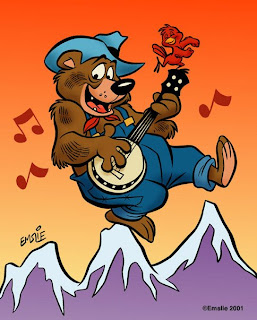"Mr.E, do you have to switch? I mean, it's not like you're not getting great results with your brush and ink. I guess it depends on working situations but, hey, if it ain't broke..."
Bitter - You know, it's funny you should ask that because I just had a similar conversation the other day with my buddy and fellow instructor, Johnny. I was telling him of my computer woes and frustration with accomplishing anything decent with Photoshop brushes, when he asked me the following: "Even if you were able to get satisfying results with the tools all operating to your liking, would you give up traditional media in favour of now working digitally?"
After thinking it over for a moment, I replied, "No, actually I wouldn't." Here are my reasons why not. First of all, even if I was able to create the "perfect brush", suitable for digital inking and painting, it would still require constantly resizing and tweaking the settings of opacity, flow, etc. As it is, I can so easily get the line I want through the simple adjusting of pressure and angle on my sable brush. Also, wielding a real brush on a real sheet of illustration board, I can swivel the board to any comfortable angle in order to more easily pull a nice controlled ink line. I can't do that with the Wacom tablet, and would therefore require an expensive Cintiq to have that ease of mobility. As it is right now, I feel very constrained using the stylus and tablet.
Also, the fact is I just love the intuitive feel of working with real media. There is something very satisfying about choosing the preferred surface on which to work, and feeling the tooth of that surface as I apply the brush with ink or paint. Likewise, there is the intuitive feel of knowing just how much to dilute the paint or not, depending on the desired effect, and then knowing instinctively just how much I can rework the paint on the board before it dries. Even aside from the tactile nature of real media, there is that appeal to the sense of smell, too. Fact is, I just love the smell of ink as I work. I've known that smell since starting to ink back when I was about 12 years old, and I'd miss it if I only inked digitally.
Finally, there's the very basic reason that, when creating art digitally, there will never be such a thing as an original piece of art. Anything tangible to hold in your hands or frame on the wall will always have to be a printout. Frankly I love to look at my original artwork, where I can study it and remember how I achieved a certain effect by observing and analyzing the brush work.
So why do I want to be able to learn how to ink and paint digitally? Perhaps somewhat as a matter of satisfying my artistic ego, knowing that I can keep pace with the computer age. Mostly, though, I think it's out of a fear that if I can't produce work digitally, that I become less marketable, as I'm finding that some clients now insist on having digital art. I once talked to an art rep who told me that he won't even look at anything inked traditionally anymore, as he wants everything in a vector line for reproduction at any size. So there I can't even win with Photoshop, as I'd need to learn that wretched Illustrator program with the insidious bezier curves/ pen tool.
 Personally, I find the digital trend highly disturbing and would rather continue to coast along with my traditional skills honed over a lifetime of working this way. At most, I would rather utilize the computer only in a hybrid fashion, combining my hand inked drawings with the ease of adding flat areas of colour with Photoshop. A little bit of rendering is okay, though I prefer not to overdo the adding of shadows and highlights, lest the image start to look more like plastic than flesh and cloth. This image of the bear is pretty much the way I've used Photoshop in the past, and I will probably continue to use it simply as a colouring tool in most of my artwork, although I would still like to see what I could accomplish if I can ever get a handle on this digital painting stuff.
Personally, I find the digital trend highly disturbing and would rather continue to coast along with my traditional skills honed over a lifetime of working this way. At most, I would rather utilize the computer only in a hybrid fashion, combining my hand inked drawings with the ease of adding flat areas of colour with Photoshop. A little bit of rendering is okay, though I prefer not to overdo the adding of shadows and highlights, lest the image start to look more like plastic than flesh and cloth. This image of the bear is pretty much the way I've used Photoshop in the past, and I will probably continue to use it simply as a colouring tool in most of my artwork, although I would still like to see what I could accomplish if I can ever get a handle on this digital painting stuff.